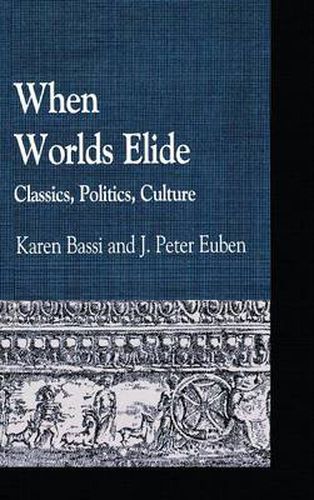Readings Newsletter
Become a Readings Member to make your shopping experience even easier.
Sign in or sign up for free!
You’re not far away from qualifying for FREE standard shipping within Australia
You’ve qualified for FREE standard shipping within Australia
The cart is loading…






For better or worse, the ancient Greeks retain their cultural, political, and philosophical authority for contemporary educators and actors. Maureen Dowd has talked about the Hellenization of the Bush administration, Thucydides has been used as a template to analyze the Iraqi War and the War on Terror, Greek drama has been repeatedly performed in sometimes spectacular if unconventional ways, while the Trojan War, the battle of Thermopylae, the Spartans, and Alexander have all been the subjects of recent films. Last year the New York Times carried a front page story about conservatives taking a new tack by establishing beachheads for programs in Western Civilization and American Institutions in which the ancient Greeks hold pride of place. The contributors to When Worlds Elide are also invested in having Greek philosophy, literature, and political theory taken seriously in contemporary debates-whether over modes of interpreting Plato, Athenian democracy, gender, ethnicity, or materiality. What distinguishes this book is the substantive range of the essays in it and the generative potentialities of using ancient authors and events in analyzing these debates. It begins from the premise that the Greeks (like the French or the Chinese ) obscures the contested histories of ethnic, geographic, and political formations in favor of an idealized dehistoricized collectivity. The also book also illustrates the ways in which ancient texts must be understood within the history of interpretative practices, which means that the Greeks are more a moving target than a stable entity, and that each generation of interlocutors formulates continually transforming questions, readings, and arguments. Finally, this book supposes that an interrogation of the Greek legacy depends on interdisciplinary work where interdisciplinarity functions as a verb-that is, something that is always in the process of being achieved.
$9.00 standard shipping within Australia
FREE standard shipping within Australia for orders over $100.00
Express & International shipping calculated at checkout
For better or worse, the ancient Greeks retain their cultural, political, and philosophical authority for contemporary educators and actors. Maureen Dowd has talked about the Hellenization of the Bush administration, Thucydides has been used as a template to analyze the Iraqi War and the War on Terror, Greek drama has been repeatedly performed in sometimes spectacular if unconventional ways, while the Trojan War, the battle of Thermopylae, the Spartans, and Alexander have all been the subjects of recent films. Last year the New York Times carried a front page story about conservatives taking a new tack by establishing beachheads for programs in Western Civilization and American Institutions in which the ancient Greeks hold pride of place. The contributors to When Worlds Elide are also invested in having Greek philosophy, literature, and political theory taken seriously in contemporary debates-whether over modes of interpreting Plato, Athenian democracy, gender, ethnicity, or materiality. What distinguishes this book is the substantive range of the essays in it and the generative potentialities of using ancient authors and events in analyzing these debates. It begins from the premise that the Greeks (like the French or the Chinese ) obscures the contested histories of ethnic, geographic, and political formations in favor of an idealized dehistoricized collectivity. The also book also illustrates the ways in which ancient texts must be understood within the history of interpretative practices, which means that the Greeks are more a moving target than a stable entity, and that each generation of interlocutors formulates continually transforming questions, readings, and arguments. Finally, this book supposes that an interrogation of the Greek legacy depends on interdisciplinary work where interdisciplinarity functions as a verb-that is, something that is always in the process of being achieved.